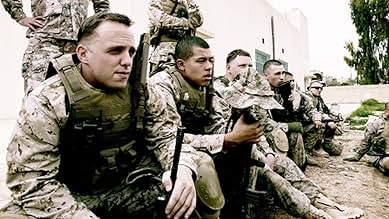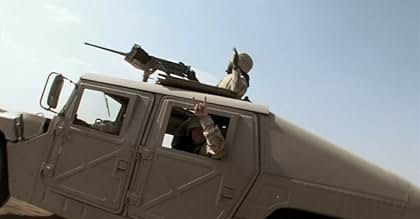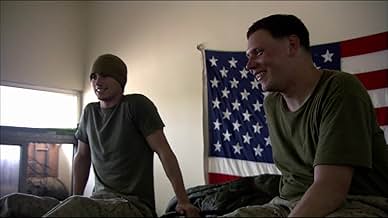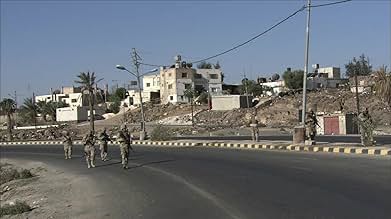Battle for Haditha
Ajouter une intrigue dans votre langueAn investigation of the massacre of 24 men, women and children in Haditha, Iraq allegedly shot by 4 U.S. Marines in retaliation for the death of a U.S. Marine killed by a roadside bomb. The ... Tout lireAn investigation of the massacre of 24 men, women and children in Haditha, Iraq allegedly shot by 4 U.S. Marines in retaliation for the death of a U.S. Marine killed by a roadside bomb. The movie follows the story of the Marines of Kilo Company, an Iraqi family, and the insurgent... Tout lireAn investigation of the massacre of 24 men, women and children in Haditha, Iraq allegedly shot by 4 U.S. Marines in retaliation for the death of a U.S. Marine killed by a roadside bomb. The movie follows the story of the Marines of Kilo Company, an Iraqi family, and the insurgents who plant the roadside bomb.
- Réalisation
- Scénario
- Casting principal
- Récompenses
- 2 victoires au total
- Cpl. Matthews
- (as Matthew R. Knoll)
- Doc
- (as Thomas Hennessy Jr.)
- Iraqi Translator
- (as Ali Adil Aj-kaa)
- Ahmad
- (as Falah Flayeh)
Avis à la une
That said, I feel this movie is much better then most. The film clearly had an agenda and bias, and completely off the mark in terms of representing military tactics, equipment, etc... that is pretty much standard for any movie. I appreciated how the movie wasn't overly dramatic when showing issues faced by and actions of the various parties. One thing I wish the movie did take in to account is bullets pass through those walls like paper. I would wager that a large number of civilians were killed simply during an exchange of fire between the Marines, fighters, and then civilians who may have just seen a loved one fall. I have seen this happen often and I hope one day that reality is brought to light rather then showing young Marines on a blind rampage. However, no one knows exactly what happened except those who were there, and even that "reality or truth" depends on the perspective and state of mind of the observer.
Another positive is how the movie doesn't really show any right or wrong, good or bad, that things just are and "sh!t happens". If anything, I do think that is the true agenda of the movie even if there was a bias in its portrayal. Also, I appreciated the use of Iraqi dialect of Arabic instead of modern standard, Egyptian, Syrian, etc. Another accuracy plus was how close the town/city looked compared to cities of the region. Though clearly not Haditha, I have not seen any movie closer to the truth in that regard.
On a personal note, I think many of the comments made by Cpl Ramirez were spot on if a bit staged. I am not going to comment on any particular comment because you either understand or you don't. Also, and I know this is a bit of a stretch, but I refuse to give credibility to any one who may seek to either attack or defend (verbally) our war fighters because context is everything and the most people don't have or understand the context.
I recommend this movie to anyone who is able to take if for what it is worth by dropping the expectation of realism while not adding meaning where there is not. Also, I hope people realize that no matter how many actual Marine veterans or Iraqi's (most westernized), the film is a product of the film maker and subject to their interpretation. I only wish I could have had my say about the movie sooner, if only to plant the seed that people should take this movie, and the other reviews including mine, with a grain of salt.
Only issues I noticed are: That the translation of the spoken Arabic is sometimes misleading and has no relation with what they actually said.
Some of the actors' accents are not Iraqi (Palestian, Egyptian, and others...), but most are Iraqis.
It's still a great movie that shows what happens in Iraq, and that war is ugly.
It's one of the rare movies that show the issue from the other side.
The acting is great, so is the scenery (it does look a lot like Iraq).
I say it again, it made me cry, a lot.
I won't list all of the technical errors I spotted because after a career in the military which spans more than 40 years and three major conflicts I spotted quite a lot. But the following were the most obvious and, for all serving and former military personnel, quite laughable: The casual way the soldiers patrolled both in vehicles and on foot, the .50 Cal machine guns that are never loaded, the extras who appear at the IED site with weapons but no webbing, the Humvees parked in nice little rows along the side of the road with no protection, armour or weapons. And as for anyone standing directly in front of a metal gate and firing a burst into the lock in order to gain entrance, well if he hadn't shot himself or his team with ricochets the first time he did it he certainly would have on subsequent occasions.
I assume these were errors because if they reflect the current tactics and drills of the US Marines then the quality has really deteriorated seriously since I served alongside them in Vietnam.
I can't fault the acting and I think this is the only thing which saves this film. However, the continuity and story left a lot to be desired. For example, in the film Ramirez didn't order the executions - he ordered his teams to clear the houses which is a normal action when in contact with insurgents. The marines took it upon themselves to throw grenades and fire indiscriminately into the rooms. That is what the film showed. But if he did order the massacre then the things he'd been through must have been progressively leading him to this time and place, but we don't see any of that in the film beyond a short dialogue about him having frightening dreams. So the big question that we are left with is why did he allegedly give the orders which, as I said, it isn't really all that clear in the film that he did so? Why were all of the NCOs charged with murder? Where was the investigation?
I thought it was a good idea to include their perspective but the dialogue amongst the civilians was almost too much to bear. I know the film was unscripted but they must have been instructed to say whatever they want but make sure it makes American audiences feel that their presence in Iraq is welcomed, albeit an unnecessary evil that the civilians must put up with. But did they have to be so effusive about it?
And as for the men who planted the IED and fired the first shots on the troops - why should they have an excuse for doing so that would gel with western audiences? Why couldn't they do it, for example, just because they wanted to hurt the occupying forces? But they, like the Americans, were 'just following orders' weren't they? They, like the solders, were pawns in a game being played out by loonies with power but no intention of doing the dirty work themselves. But we need these kind of explanations don't we so that we don't leave the cinema wondering why things happen. But not everything has a tangible and logical reason. We had a wonderful saying in Vietnam - s**t happens so just get over it and move on. Why couldn't the insurgents have, as their reason for planting the IED and firing on the troops, that they are who they are and we are who we are and that is there is to it? It seems to work so well for other mujahadeen.
I know that this film is based on actual events but I'm afraid that the whole thing was trivialised by poor script (well, there was none and this shows), poor casting (am I the only one who noticed a likeness between the marine captain and the imam?), poor technical direction, and poor directing.
Sorry - a big thumbs down from me.
All this is very interesting, and the killings are similar to those in De Palma's flashy but so very slipshod 'Redacted,' but so very, very different in this new context with the simpler shoot--just a digital camera that you can forget about after a while, whereas De Palma rubs your nose in the multiple media feeds, the other American soldiers less specific here but cruder and perhaps more authentic; some of them like Ruiz were in the war themselves, and served, and know the way to act without being told.
But what is extraordinary in Broomfield's film isn't any of this so much as one thing that typically, American reviewers have hardly seemed to notice. This is: that not only are the Iraqis seen up close, they are real Iraqis, speaking Iraqi Arabic, and many of them, like the young actor who plays Ramirez, also on the other side as victims and non-combatants, veterans of the war, now living where the film was made and where they fled to, in Jordan. When Ramirez shows a big scar on his leg and says he almost lost it, it's Ruiz's real battle scar. Ruiz's performance has a new kind of conviction.
Why would Americans' notice that about the Iraqi Arabic, the authentic Iraqi non-actors playing the roles of insurgents and local inhabitants, and why would they care? In fact even the Choir to whom this anti-war movie is preaching are as ignorant and indifferent to the specifics of Middle Eastern cultural reality as the naive and headstrong men who got us into the war and the poor and uneducated boys who have pursued it and died in it and come back maimed and mentally damaged from it. But in the future, this may come to matter, and even be understood by American Iraq war veterans. Language is important, and culture is important. One shouldn't have to say that. But if it were understood, the imperial indifference of "bringing democracy to the Middle East" would crumble, and it wouldn't seem so easy to think that killing a hundred thousand civilians would make us friends.
Using real Iraqis and a lead Marine who's an Iraq war vet were master strokes, but this doesn't excuse the film from being in many ways self-damagingly roughshod and, despite the multiple viewpoints, still skewed at times. The Iraqi civilians who become victims are given a fairy tale simplicity, their complicity or involvement in weapons and explosives, though alluded to, not specified for any of the victims. There needed to be something more specific about a Marine other than Ramirez.
The chief bad guys, which seems right, are those at one remove, the Marine supervisors away from the front, and the local imam whose encouraging the locals to ignore the danger and hold a celebration is a cynical gesture to worsen the casualties and make them seem more cruel to the media.
Broomfield has used blunt instruments to shape his story, and his ending is a little muddled (partly from necessity, since the accused Marines hadn't yet been tried). Nonetheless the authenticity, particularly of the Iraqis, but of the whole scene, wins The Battle of Haditha a special place in the less-than-stellar roster of Iraq war films thus far delivered.
I needn't have worried because Broomfield has made a film that will be remembered as being the moral and artistic yardstick as to how other films dealing with the conflict will be judged . Whatever your opinion of the invasion of Iraq ( I like the vast majority of Brits was against it ) there is no way you can heap criticism on TBOH for being pro or anti propaganda for either side . Sure it's anti war but does point out the dangers and frustration faced by both serving soldiers and innocent civilians in a war zone . If there is any type of villain it's probably Al Qaeda itself . Certainly Broomfield deserves congratulations for making a very subtle point that there's a difference between indigenous secular Sunni insurgents who are fighting for their country and those outsiders who want to turn Iraq in to an Islamic theocracy . This probably works best in the scene where the Iraqi insurgent breaks down in tears saying he wished he'd never planted the bomb that leads to the massacre while the sheik rejoices with barely concealed glee that this is a wonderful propaganda coup for Iraq , the more civilians killed by the occupation forces means more recruits for Al Qaeda
If I do have any artistic problems with the mis-en-scene it's that some of the acting is different from what an avid cinema goer is used to . This is in no way a criticism because much of the acting is powerful especially Elliot Ruiz as Cpl Rameirez , even more amazing when you consider there's very few professional actors cast . It's just that when you're very used to life long lighter than life or larger than life performances by ( Insert well regarded big name actor here ) you are slighter aware how different the acting is from what you usually see . Let me repeat though that it's not a real criticism
Respect too to Mr Broomfield for giving a very informative Q & A session after the showing where he was once again very even handed . He did talk a lot of sense where he said that in his humble opinion it should be Bush and Blair who should be on trial instead of the marines which led me to start a round of applause and that peace is coming to Iraq down to the fact that foreign Jihidists are murdering many Iraqis just for the sake of it . He did trip himself up later during the session when he claimed that " Britain and America spent several years arming both sides during the Iran - Iraq war " which led to me shouting " RUBBISH " but there were no hard feelings on either side and I genuinely look forward to Nick's next contribution to narrative cinema . Come to think of it if a Brit can make something so even handed why do we have to endure offensive Anglophobic garbage coming out of Hollywood studios like THE PATRIOT and THE DEVIL'S OWN ?
Le saviez-vous
- AnecdotesThe film was shot in an unconventional way whereas instead of a detailed script, there was only an outline of each scene and where the story was going. Actors would then improvise much of the dialogue based on director Nick Broomfield's instructions.
- GaffesAll of the Iraqi Army soldiers in the film are seen wearing the "three-color" DCU uniform, although in the time period that the movie takes place in (late 2005), the Iraqi military wore the "chocolate-chip" DBDU uniform.
- ConnexionsReferences Breaking News (2004)
Meilleurs choix
- How long is Battle for Haditha?Alimenté par Alexa
Détails
Box-office
- Montant brut aux États-Unis et au Canada
- 10 310 $US
- Week-end de sortie aux États-Unis et au Canada
- 1 982 $US
- 11 mai 2008
- Montant brut mondial
- 245 521 $US
- Durée1 heure 37 minutes
- Couleur
- Mixage
- Rapport de forme
- 2.35 : 1
Contribuer à cette page






















